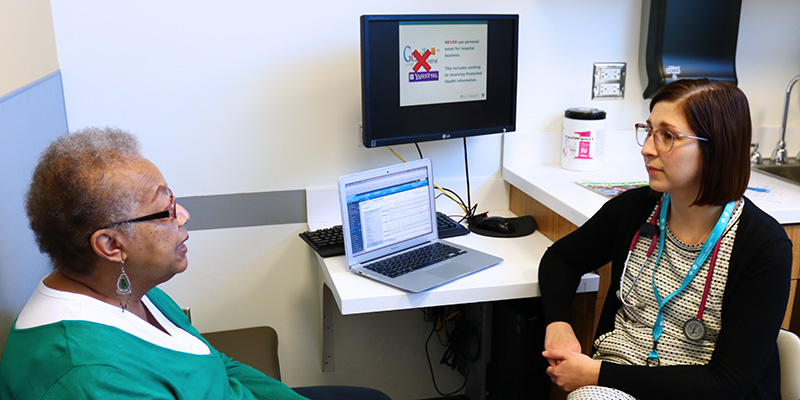
Communication between cancer specialists and primary care providers at federally qualified health centers is an important part of a successful treatment plan for breast cancer patients, according to new research at the University of Illinois Cancer Center.
“Due to increasing shortages of cancer specialists and the growing number of cancer survivors, primary care providers, especially in low-resource areas, will have a greater role in cancer-related follow-up care,” said Tamara Hamlish, PhD, research scientist in the UI Cancer Center’s survivorship program and lead author on the paper published in the Journal of Racial and Ethnic Health Disparities.
“Coordinating care is especially vital, as vulnerable populations present at later stages and have multiple chronic medical problems.”
Primary care providers, who may come from family or internal medicine, are specialized in diagnosing, treating and preventing a wide variety of conditions. They are the most familiar with a patient’s medical history, and play an important role in preventing and managing health conditions.
The Commission on Cancer amended its treatment summaries and survivorship care plans – a record of a patient’s cancer and treatment history, as well as any checkups or follow-up tests needed in the future – in 2018 to improve communication across all health care systems. Prior to the COC’s requirement, Hamlish and her colleagues reviewed the medical records of breast cancer patients at five FQHCs to better understand how coordination was achieved.
Few studies have evaluated care delivery for patient outcomes, including health care utilization. Hamlish and her colleagues examined the charts for external cancer records, written history of breast cancer patients by primary care providers, and documentation of follow-up care by primary care providers. Less than 50% of the charts contained records of more than one area of cancer-relevant follow-up care, Hamlish said. In addition, availability of external records did not increase a primary care provider’s follow-up care.
A recent study examining treatment to cancer survivors in 12 advanced primary care practices discovered three barriers, Hamlish said: The absence of a recognized distinct clinical category of survivorship in primary care; a lack of information to treat this patient population; and current information systems unable to support survivorship care due to time constraints with patients and limited reimbursement for cancer follow-up care.
“It’s challenging to effectively address cancer care and other comorbidities in high-volume urban FQHCs,” said Dr. Susan Hong, director of survivorship at the UI Cancer Center and senior author on the study. “Primary care providers are likely to prioritize the delivery of primary care needs and assume that cancer specialists are addressing patient’s cancer care needs.
“We found that primary care providers were more engaged in their patient’s cancer-relevant follow-up when they themselves elicited their patient’s breast cancer treatment histories.”
The research was funded by the American Cancer Society Grant No. 217034. Assisting Hamlish and Hong were Li Liu, University of Illinois Cancer Center; Zuoli Zhang, Dr. Daniel Johnson and Dr. Olufunmilayo Olopade, University of Chicago; Dana Sohmer, Alzheimer’s Association; Zakiya Moton, UPLEVEL Leaders; and Anna Frolova, University of Illinois Urbana-Champaign.
